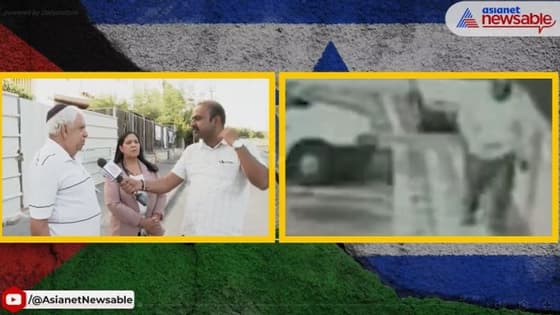
Asianet News Exclusive! 'Situation worse than our worst nightmares...' say Indian-origin Jews
Kiryat Gat in southern Israel was on the target list of Hamas terrorists who unleashed bloodshed on October 7. However, Israeli forces managed to stop the terror in its tracks. Ajit Hanamakkanavar, Editor of Asianet Suvarna News, travelled to this city, 50 kilometres from the Gaza border and met some Indian-origin residents.
Anger simmers among Israelis in the aftermath of the bloodshed unleashed by the Hamas terrorists in southern Israel on October 7. Also, on the terrorists' target list that day was Kiryat Gat, a city located 50 kilometers from the Gaza border. Though the Israeli soldiers managed to stop the terrorists from reaching the city, the rockets fired by the Hamas keep coming.

Ajit Hanamakkanavar, Editor of Asianet Suvarna News, arrived at Kiryat Gat to find, among the debris of buildings struck by Hamas rockets, a strong sense of resilience. He came across two Indian-origin residents, who believed that if those supporting Hamas were to stop doing so, there might be room for a chance at peace.
Harun and Julie came to Israel in 1969. They both hail from India's financial capital Mumbai. Harun recalled how, on October 7, he was on his way to the mosque at 6:30 am to offer prayers on the occasion of Simchat Torah when the siren went off, signalling an imminent attack. Harun and others had to seek safety in a designated room after performing their prayers.
Following the namaz, a rocket struck nearby, causing an explosion. Fortunately, there were no casualties.
During the conversation, the duo expressed their frustration at the persistent threat of violence and their inability to live in peace. They questioned the terrorists' motivations and lamented the impact on innocent civilians, including children and women.
Harun mentioned that the rocket attacks occur periodically. He has witnessed multiple instances of rockets being launched into the air during these attacks.
When questioned about the situation concerning women and small children in the area, Julie shared a personal experience of her 89-year-old mother being near a rocket attack site. Julie’s family includes members of the military, and they all want peace. She appealed for support and an end to the war.
She described it as "a situation worse than their worst nightmares".
Julie labelled those who support Hamas and are against Israel as inhumane, referring to them as 'demons'. She criticized Hamas's actions, particularly the harm inflicted on innocent children and pregnant women. Harun echoed these sentiments, emphasizing that such actions go against humanity and the very essence of human values. He echoed Israel's resolve not to be intimidated and to respond to threats. He mentioned the need to secure captives from Israel held by Hamas, particularly ill children and women, and raised concerns about the methods used by Hamas to capture and mistreat individuals.
When asked about the civilian casualties in Palestine following Israel's airstrikes, Julie showed empathy for the victims, particularly the children and women, but termed the situation as complex. She suggests that if those on the opposing side were to stop supporting Hamas, there might be room for a chance at peace.
When pointed out how the younger generation in Palestine harboured strong anti-Israel sentiments and support for Hamas, Julie explained that these sentiments are often ingrained in young minds from childhood, with the belief that Israel is not good.
The situation is such that the duo now believes that the possibility of peace may have existed in the past, but given the current circumstances and events, they do not see it as achievable. Harun reflected on the past and noted that they might have considered giving Gaza to the other side. He alleged that money was directed towards terrorism instead of improving Gaza.
Harun also shared his positive experiences in India, where he and his family were treated well and always felt at home. He highlighted the strong connection between Israel and India, expressing the need for India's support for Israel in the war.
Julie, too, expressed her love for India and her family's strong ties to the country. She emphasized that there is no difference between India and them, which is why they seek India's support.
Arun explained that he can speak and write in Hindi and Marathi due to his early years in India. He also mentioned proficiency in English. He drew a parallel between the situation in Gaza and the Kashmir conflict. He asserted that, like Kashmir belonging to India, Gaza belongs to Israel. He referenced the film 'The Kashmir Files' and sent greetings to Prime Minister Narendra Modi on behalf of the Indian-Jewish community residing in Israel.